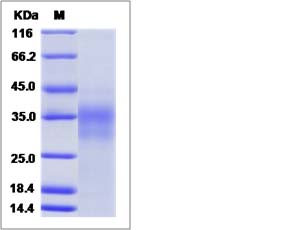Human CD153 / CD30L / TNFSF8 Protein
CD153,CD30L,CD30LG
- 100ug (NPP3936) Please inquiry
| Catalog Number | P10040-HNCH |
|---|---|
| Organism Species | Human |
| Host | Human Cells |
| Synonyms | CD153,CD30L,CD30LG |
| Molecular Weight | The recombinant human CD30L consists of 172 amino acids and predicts a molecular mass of 19.6 kDa. |
| predicted N | Gln 63 |
| SDS-PAGE |  |
| Purity | > 90 % as determined by SDS-PAGE. |
| Protein Construction | A DNA sequence encoding the human CD30L (NP_001235.1) (Gln63-Asp234) was expressed with two additional amino acids (Gly & Pro ) at the N-terminus. |
| Bio-activity | |
| Research Area | Cancer |Invasion microenvironment |Angiogenesis |Cytokines / Chemokines in Angiogenesis |TNF |
| Formulation | Lyophilized from sterile PBS, pH 7.4. 1. Normally 5 % - 8 % trehalose and mannitol are added as protectants before lyophilization. Specific concentrations are included in the hardcopy of COA. |
| Background | CD30 ligand (CD30L), also known as CD153 and TNFSF8, is a membrane-associated glycoprotein belonging to the TNF superfamily and TNFR superfamily, and is a specific ligand for CD30/TNFRSF8 originally described as a cell surface antigen and a marker for Hodgkin lymphoma and related hematologic malignancies. CD30L is a type-II membrane glycoprotein expressed on activated T cells, stimulated monocyte-macrophages, granulocytes, eosinophils, and some Burkitt-like lymphoma cell lines. CD30L is capable of transducing signals through CD30 on different CD30+ lymphoma cell lines, and mediates pleiotropic biologic effects including cell proliferation, activation, differentiation, as well as cell death by apoptosis. CD30-CD30 ligand interaction has been suggested to have a pathophysiologic role in malignant lymphomas, particularly Hodgkin disease, large cell anaplastic lymphomas and Burkitt lymphomas, and is also involved in activation and functioning of the T cell-dependent immune response. Thus, CD153 and its receptor CD30 are regarded as therapeutic targets in hematologic malignancies, autoimmune and inflammatory diseases. |
| Reference |
